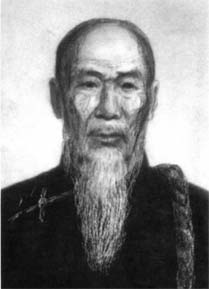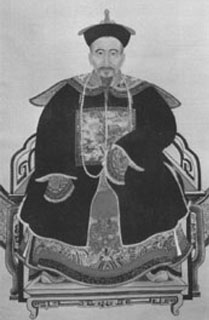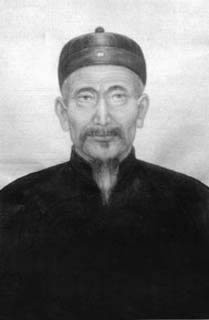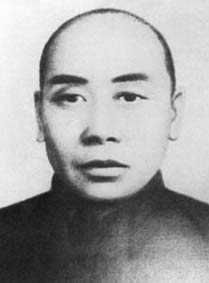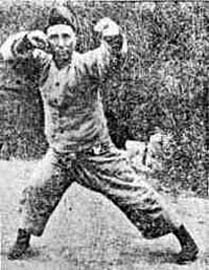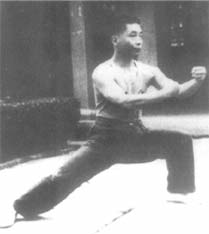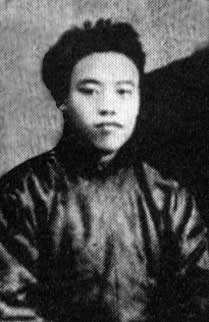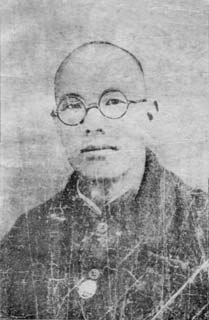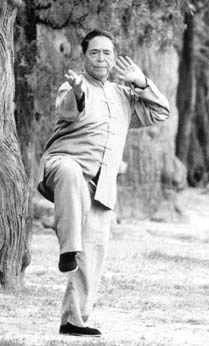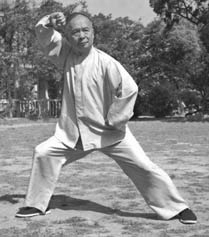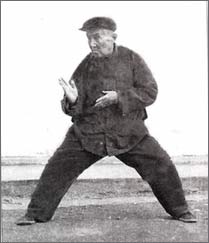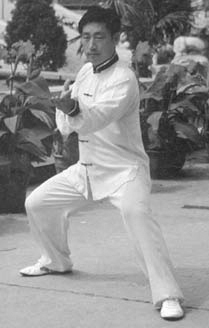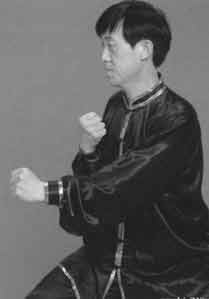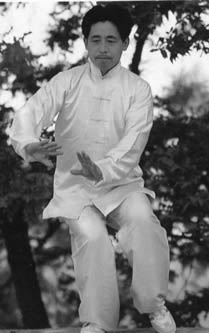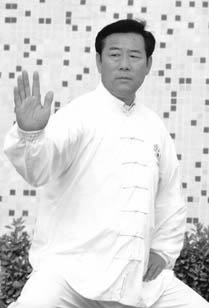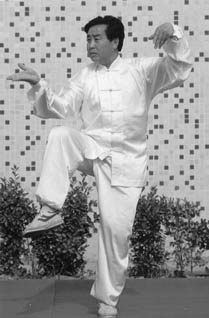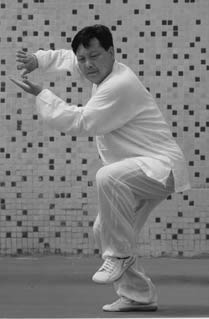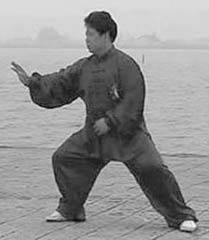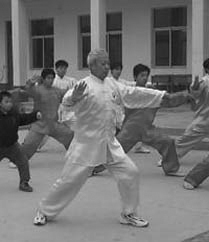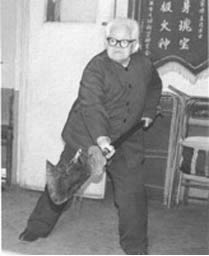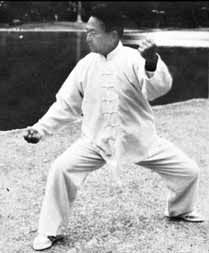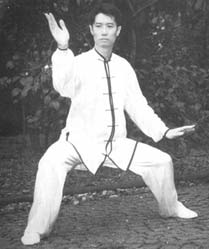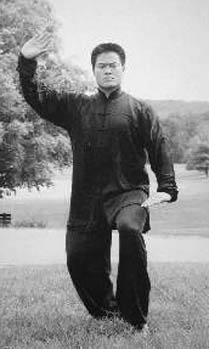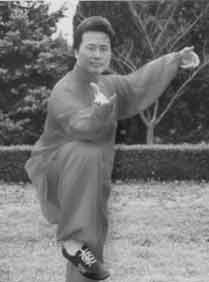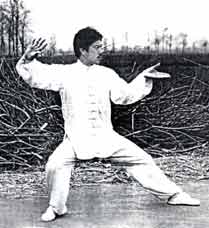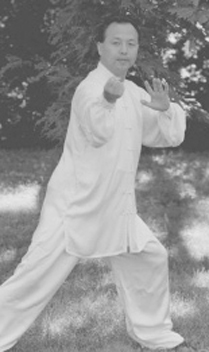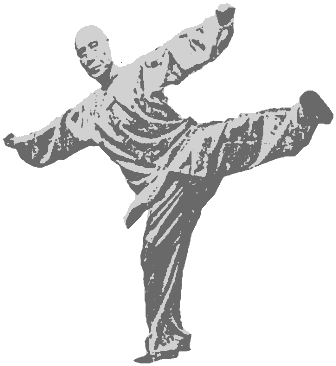Chen Fake (1887-1957) was of the 17th generation
of the Chen family. His father was Chen Yanxi, a famous master and
practictioner of Chinese Medicine. Chen Yanxi was the "standard
bearer", or most skilled practitioner, of his generation, a title
passed down from father to son in Chenjiagou from the time of Chen
Wang Ting.
Chen Fakewas born late in his father's life. As a result of his brothers
all dying in an epidemic, he was a treasured child, and became spoiled
and lazy. He ate too many sweets, and did not exercise, becoming unfit,
with a stomach ailment. He was not expected to train as a result,
and lagged behind his contemporaries in the village in Taijiquan.
Before he entered puberty, his father (as a result of his success
and fame as a cargo transport guard) had been hired by the provincial
governor of Shandong, Yuan Shikai, to live at his home and train his
sons in Taijiquan. Thus he was uninvolved in his son's daily training.
In the absence of his father, a cousin of Chen Fake's, Chen Boqu,
was invited to live with the family in order to help with farm work
and aid the household. He was strong, and one of the best practitioners
of the younger generation in Chenjiagou. He was nicknamed "The
Bull" for his strength. He was known to be unrelenting in his
practice, often injuring his opponents in push hands practice.
It was the opinion in the village that Chen Fake, at age 14, was
too weak to ever hope to assume his father's heriditary mantle of
"standard bearer". Upon hearing this, Fake became determined
to uphold the family tradition. He realized that he must catch up
with Bull in his level of skill.
He could not see how he could do this, as they spent all their time
together, eating, working, sleeping, and training. How could he match
him? As long as bull continued training, he would always be ahead
of him, like a faster runner in a race.
One morning in 1901, as they walked to the fields to work, Bull realized
that he had forgotten a tool. He ordered Fake to go back to the house
to get it. He told him to hurry, and he would walk slowly until Fake
had caught up with him.
This gave Fake an idea. He realized that if he trained more intensively
than Bull, he could reach his level. But he couldn't let Bull know
of his efforts, lest he intensify his own efforts, and maintain his
edge in skill.
So Fake began to take every opportunity to train. After lunch, when
everone napped, Fake trained: he woke in the middle of the night to
practice quietly in his room while everyone slept. His cousin never
discovered his regimen.
In 1904, after three years of this schedule, his health had greatly
improved. His gongfu was also much improved.
He decided to test his ability against Bull, and "crossed hands"
with him in a pushing hands practice. He tried three times to throw
Fake, and each time Fake countered his attempts and repulsed him.
Bull realized that somehow, Fake had surpassed him in skill. He accused
Fake of using secret "standard bearer" techniques passed
down from his father, which wewre unavailable to practitioners outside
his lineage.
Chen Fake informed him that he did indeed have a secret technique,
but it was not from his father. He had been away from the village
for three years: how could he have taught Fake any techniques? Fake's
"secret technique" was contained in one word: practice.
Chen Fake practiced with a single minded intensity, performing at
least 30 sets of boxing a day, as well as 300 repetitions of "pole
shaking" exercises.
In 1907, at the age of 20, he participated in a tournament in Wenxian,
winning top honors. Word of his skill reached the warlord Han Fuju,
who wished to employ him as a boxing teacher. Chen refused, and as
a result, the angered warlord ordered a subordinate to attack Chen
with a spear. Chen easily countered his attack, grasping the tip of
the spear as it jabbed toward him, and reversing the force against
the attacker. He was also attacked by a man with a broadsword, and
forbidden to use his hands. He disarmed the man with his feet.
In 1926, during the period of civil disunity known as the "warlord
era" in China, unrest and banditry was rife. A religious sect
known as the "Red Spears" were rampant, capturing several
districts near Wenxian, the district containing Chenjiagou. Wenxian,
under threat of occupation, and unable to attain assitance from the
regional warlord, appealed to Chen Fake and his students (among them
Chen Zhaopei, who worked with him as an instructor at the Wenxian
County Martial Arts School) to assist in the defense of the district.
Soon, the Red Spears arrived, and surrounded the walled city. Chen
Fake waited at the drawbridge leading to the city gate, holding a
long waxwood pole. One of the Red Spear fighters rushed at him with
a spear, thrusting it at him. Fake deflected it with a single motion,
causing the spear to fly into the air out of the bandit's hands. Fake
then thrust the pole forward with great force, penetrating the bandit's
chest with it. The Red Spears dispersed in fear at the sight. Chen
Fake had saved the city.
In 1930, at age 43, Chen Fake travelled from Chenjiagou to Beijing
at the invitation of his nephew Chen Zhaopei, who had already established
a school for Chen Taiji there. to teach Taiji.
At that time, Yang style Taiji was widely popular in Beijing. It
was known there that Yang Luchan, the style's founder, had learned
his art in Chenjiagou (from Chen Chang Xing, Chen Fake's great grandfather).
Chen Fake made the art of Chen style Taijiquan famous in Beijing.
He met many challengers, defeating all comers. He was noted for his
high morality (wu de): he defeated his challengers without causing
undue harm, often converting them to students.
Over time, he developed a new method of Taiji, the "xin jia"
school, which became famous as an advanced method of training.
He had several children, among them Chen Zhaoxu, and Chen Zhaokui,
both noted masters.
Perhaps his greatest contribution to martial arts was his creation
of the "xin jia" branch of Chen family Taiji, which he taught
from 1940 to his death in 1957.
He cofounded the Capital Wushu Association of Shanxi with Hu Yaozhen
(Xingyi instructor of Feng Zhiqiang).
Chen Fake taught a number of students, among them his second son,
Chen ZhaoXu, his third son Chen Zhaokui, Chen Zhaopei, Feng Zhiqiang,
Gu Liuxin, Liu Ruizhan, Tang Hao, Lijinwu, Li Mumin, Hong Junsheng,
and Tian Xiuchen. |
